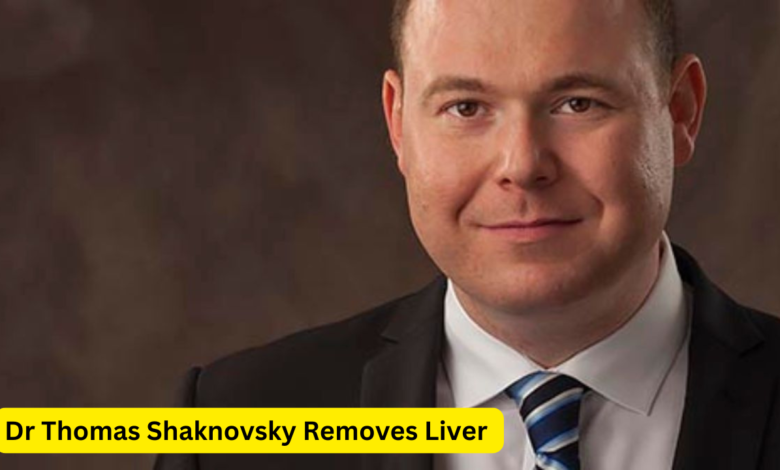Dr Thomas Shaknovsky Removes Liver

Dr Thomas Shaknovsky Removes Liver, In recent times, the medical community has been abuzz with the news surrounding Dr. Thomas Shaknovsky, a highly skilled surgeon, whose name has come to prominence due to a particularly controversial case. This incident, which took place in Florida, has raised significant ethical questions and concerns about medical practices and patient safety. The crux of the matter revolves around a highly complex and ultimately tragic surgical procedure in which Dr. Thomas Shaknovsky removes liver instead of the intended spleen.
The Surgery that Shocked Florida
In the medical world, Dr. Thomas Shaknovsky is known for his precision and expertise. However, even the most skilled professionals can find themselves in the spotlight for all the wrong reasons. This was the case when a routine surgery took an unexpected turn. The patient, under the care of Dr. Shaknovsky, was scheduled for a spleen removal—an operation that, while serious, is generally considered routine. However, the procedure became anything but routine when the liver was mistakenly removed instead.
This incident has sparked outrage not only among the patient’s family but also within the broader medical community. The removal of the liver, a vital organ responsible for numerous essential functions such as detoxification, protein synthesis, and the production of biochemicals necessary for digestion, was a catastrophic mistake. The repercussions were immediate and severe, leading to widespread media coverage and legal action.
Understanding the Gravity of Liver Removal
To fully grasp the seriousness of this incident, it’s essential to understand the liver’s role in the human body. The liver is a powerhouse organ, responsible for a range of critical functions that keep the body healthy and functioning. It is involved in:
- Metabolism of carbohydrates, proteins, and fats
- Detoxification of blood
- Synthesis of proteins necessary for blood clotting
- Storage of vitamins and minerals
- Production of bile, which helps digest fats
Given these vital roles, the removal of the liver is not only life-threatening but also irreversible. Patients who undergo such a procedure without the appropriate cause face dire consequences, often leading to death or severe, permanent disability. In this case, the patient’s life was irrevocably altered, and the mistake has brought about an intense scrutiny of Dr. Thomas Shaknovsky’s practice and the medical facility involved.
How Could This Happen?
Medical errors, while rare, are not unheard of. However, a mistake of this magnitude raises serious questions. How could a surgeon as experienced as Dr. Thomas Shaknovsky make such a critical error? There are several factors that could contribute to such a mistake:
- Miscommunication among the surgical team: In high-stakes environments like an operating room, clear communication is paramount. A breakdown in this communication can lead to tragic outcomes.
- Inadequate pre-surgical preparation: Proper preparation before surgery is crucial. This includes reviewing the patient’s medical history, understanding the specific anatomy of the patient, and double-checking all details before proceeding.
- Human error: Even the most skilled surgeons are human, and humans are fallible. Fatigue, stress, or distraction can all contribute to errors in judgment.
This incident has led to calls for more stringent checks and balances within surgical practices, including the implementation of more robust safety protocols to prevent similar errors in the future.
Legal and Ethical Ramifications
The incident involving Dr. Thomas Shaknovsky removes liver has not only medical implications but also significant legal and ethical ramifications. The patient’s family has pursued legal action, and the case has brought to light the importance of medical accountability.
From an ethical standpoint, this case challenges the trust that patients place in their healthcare providers. Trust is the cornerstone of the doctor-patient relationship, and when that trust is broken, it can have far-reaching consequences. The case has also sparked a broader conversation about the need for transparency in medical errors. While it is crucial to hold practitioners accountable, it is equally important to create an environment where medical professionals can learn from mistakes without fear of retribution.
The Impact on Dr. Shaknovsky’s Career
For Dr. Thomas Shaknovsky, the consequences of this incident extend beyond the immediate legal and medical fallout. His reputation, which was built on years of successful surgeries and patient care, has been deeply affected. The medical community is now questioning his competency, and his future in the field may be in jeopardy.
However, it’s important to note that one mistake, no matter how grave, does not define a professional’s entire career. There have been instances where surgeons have bounced back from significant errors, using the experience to advocate for better practices and improved patient safety measures.
Patient Safety: A Priority Moving Forward
The incident with Dr. Thomas Shaknovsky serves as a stark reminder of the importance of patient safety in healthcare. While modern medicine has made incredible strides, the human element remains a critical factor in ensuring positive outcomes. Moving forward, there must be a renewed focus on:
- Enhanced training and education for medical professionals: Continuous learning and improvement are essential in the medical field. Surgeons and their teams must be up-to-date with the latest techniques and safety protocols.
- Implementation of advanced safety measures: Technologies such as electronic medical records, checklists, and surgical time-outs are tools that can help reduce the risk of errors.
- Fostering a culture of openness and accountability: Mistakes should be viewed as opportunities for learning rather than just grounds for punishment. This can help prevent future errors and improve overall patient care.
Conclusion: Dr Thomas Shaknovsky Removes Liver
The case of Dr. Thomas Shaknovsky removes liver is a tragic reminder of the stakes involved in medical care. While the incident has undoubtedly had devastating consequences, it also offers an opportunity for the medical community to reflect, learn, and improve. Ensuring patient safety must always be the top priority, and this case should serve as a catalyst for positive change in the field of surgery.
As we look to the future, the question remains: How can the medical community better safeguard against such errors? We invite you to share your thoughts in the comments below.





One Comment